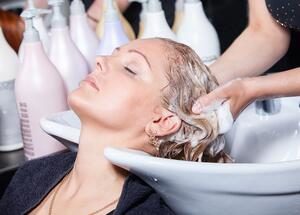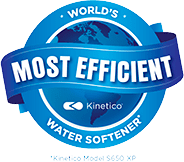Did you know the beginning of personal hygiene dates back to prehistoric times? In fact, the earliest humans understood that water, from the lakes and rivers they lived near, had the ability to clean things, or at least rinse mud off their hands. Realizing they needed more than just water to truly clean themselves, people began making soap as early as 2800 B.C. With the creation of soap came the problems we still face today, soap scum. It’s a problem that dates back nearly 5,000 years.
Although you use soap to clean your hands and body today, you likely don’t use it to clean your hair. But even the best quality shampoo can leave your hair feeling brittle and damaged if you use hard water. So, how do you clean your hair without damaging it or leaving buildup?
Here are three things your hairdresser wants you to know about hard water hair.
1. It’s the Water, Not Your Hair
Water is considered “hard” when it contains certain levels of minerals, especially calcium and magnesium. Hardness levels can vary from none to extreme, depending on where you go. That’s because natural rainwater is mineral-free (soft) but can pick up dissolved minerals as it travels through soil or rock. Water treatment plants generally do not remove the offending minerals.
2. Symptoms of Hard Water Hair
We call water with high mineral content “hard” because it’s hard to work with. (No kidding. Just ask your hair.) If you look through a microscope, you can see that your hair has tiny scales. Normal hair feels smooth because the scales lie flat, but hard water makes the scales stand up. Your hair not only feels rough, the scales cling to each other, causing tangles. That can make it more difficult to blow dry and style your hair.
Hard water also makes it difficult to rinse away soap, so you’re left with residue (think soap scum) that can make your hair limp, dull, dry, and “filmy” feeling. Your scalp may feel dry or itchy, too. If you color your hair, hard water can strip away the color faster so it looks faded or even a different color. Some professionals say hard water can even increase the risk of hair breakage or thinning.
It is important to note that the chlorine levels in your water could also be affecting the health of your hair. Chlorine messes with the natural oils in your hair which reduces it’s shine and can even make it brittle.
3. You Can Fight Back!
To counteract the effects of hard water on your hair, be sure to use commercial shampoo instead of regular soap. These products are made from synthetic detergents that react less with hard water. They also contain additives that make them lather better and rinse away completely. Unfortunately, commercial shampoo also strips the natural oils from your hair. To combat that, use conditioner, which doesn’t replace the natural oils but does improve hair texture.
What hair care routine would your hairdresser recommend?
- Avoid natural shampoos, instead choose a shampoo made from synthetic ingredients.
- Use conditioner, but not too much.
- Don’t wash your hair so often.
- Use a clarifying shampoo, but only about once a week. They can be harsh on hair if used too frequently.
If you live here in Minnesota, you don’t even have to leave home to see and feel the effects of hard water on your hair. That’s because our entire state has “very to extremely” hard water. It isn’t a health problem, but it sure is inconvenient. Installing a water softener in your home is a sure way to significantly improve water quality, not only for washing your hair but for your laundry and kitchen washing, too.










